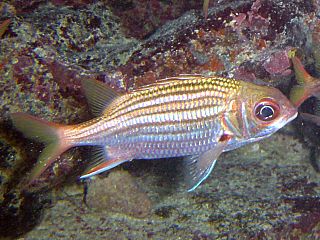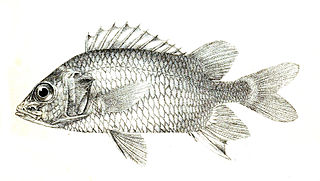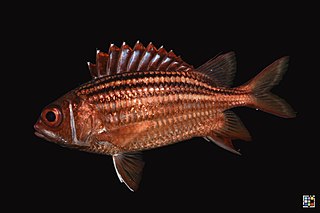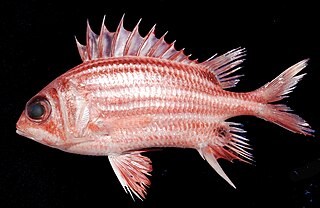
Holocentridae is a family of ray-finned fish, the only family of the order Holocentriformes. The members of the subfamily Holocentrinae are typically known as squirrelfish, while the members of Myripristinae typically are known as soldierfish. In Hawaii, they are known by the Japanese name mempachi/menpachi (メンパチ) or the Hawaiian ʻūʻū.

Sargocentron is a genus of squirrelfish found in tropical parts of the Indian, Pacific and Atlantic Oceans, with the greatest species diversity near reefs in the Indo-Pacific. Being largely or entirely nocturnal, they have relatively large eyes. Red and silvery colours dominate. The preopercle spines are venomous and can give painful wounds. Most have a maximum length of 15–25 cm (6–10 in), but S. iota barely reaches 8 cm (3 in), and S. spiniferum can reach more than 50 cm (20 in).

Sargocentron xantherythrum, commonly known as Hawaiian squirrelfish or striped squirrelfish, is a member of the squirrelfish family that is endemic to the Hawaiian Islands. It occasionally makes its way into the aquarium trade. It grows to a length of 17 centimeters (6.7 in).

Sargocentron spiniferum, common name sabre squirrelfish, giant squirrelfish and spiny squirrelfish, is a large Indo-Pacific species of squirrelfish belonging to the family Holocentridae.

The redstripe pipefish is a fish from the genus Dunckerocampus.

Neoniphon sammara, the sammara squirrelfish, also known as the blood-spot squirrelfish, slender squirrelfish, spotfin squirrelfish, armed squirrel-fish or javelin squirrelfish, is a species squirrelfish found in the Indian Ocean and Pacific Ocean from East Africa to the Hawaiian Islands. It feeds on shrimps and small crabs and fish at night and can grow up to 32.0 centimetres (12.6 in) TL in length, though its common length is only 23.0 centimetres (9.1 in) TL. Like N. opercularis, it has a venomous spine on its preopercle.

Neoniphon marianus, also known as the longjaw squirrelfish, is a species of squirrelfish found in the Western Atlantic Ocean from the Florida Keys south to Trinidad and throughout the Caribbean Sea. It lives near reefs at depths between 1 and 70 metres, usually between 30 and 60 metres, and can reach sizes of up to 18.0 centimetres (7.1 in) TL. It is nocturnal and consumes mostly shrimps, but will also eat crabs.

Sargocentron caudimaculatum, the silverspot squirrelfish or whitetail squirrelfish, is a reef-associated member of the family Holocentridae. It is native to the Indian and Pacific Oceans from East Africa to Japan and northern Australia and as far east as the Marshall Islands. It lives near reefs, but can also be found in lagoons and drop-offs at depths between 2 and 40 metres. It is a nocturnal predator, feeding primarily on crabs and shrimps. It can reach sizes of up to 25.0 centimetres (9.8 in) TL. Although it is caught commercially and can be found in the aquarium trade, there are no known major threats to this species.

Sargocentron coruscum, more commonly known as the reef squirrelfish, is a member of the family Holocentridae native to the western Atlantic Ocean from Florida, USA to northern South America. It lives over sandy and rocky substrates, as well as coral reefs, generally between 1 and 30 metres deep. It is a nocturnal predator, feeding primarily on shrimps, but will also eat crabs. It searches for food alone or in small schools. It can reach sizes of up to 15.0 centimetres (5.9 in) TL. When alarmed, it will hide in crevices between corals.

Sargocentron dorsomaculatum, also known as the spotfin squirrelfish, is a species of squirrelfish found in the western Pacific Ocean near the Ryukyu Islands, Pohnpei, Kosrae, the Caroline Islands, and Palau. It lives in shallow reefs at depths between 2 and 9 metres. Like other members of its genus, it is nocturnal and seeks shelter among corals and other structures. It can reach sizes of up to 19.7 centimetres (7.8 in) SL.

Sargocentron ensifer, or the yellow-striped squirrelfish, is a member of the family Holocentridae. It is native to the Pacific Ocean from southern Japan to New Caledonia, Hawaii and the Pitcairn Islands. It lives in deep reefs at depths between 0 and 64 metres, hiding in crevices by day and foraging for food by night. It feeds on small fishes and crustaceans and can reach sizes of up to 23.0 centimetres (9.1 in) SL, though a length of 15.0 centimetres (5.9 in) TL is more common.

Neoniphon argenteus, the clearfin squirrelfish or silver squirrelfish, is a seldom-seen member of the family Holocentridae. It is native to the Indian Ocean and Pacific Ocean from East Africa to New Caledonia. It is also found both north and south of Australia and throughout Micronesia. It lives mainly around islands and shallow reefs, and like N. sammara is associated with Acropora corals. Its depth range is 3–20 m (9.8–65.6 ft) and it can reach sizes of up to 24.0 cm (9.4 in) TL. It feeds primarily on benthic invertebrates. It is found in the ornamental trade and can be used as bait in tuna fisheries, but there are currently no known major threats to the species.

Neoniphon aurolineatus, more commonly known as the yellowstriped squirrelfish or gold-lined squirrelfish, is a member of the family Holocentridae. It has a wide range throughout the Indian and Pacific Oceans stretching east from Mauritius to Hawaii and south from Japan to the Great Barrier Reef of Australia. It lives on the outer reef slopes at depths between 30 and 188 metres. It lives near the ocean floor or in caves, generally staying alone or in small groups. It feeds on crustaceans and can reach sizes of up to 25.0 centimetres (9.8 in) TL. It is listed as "Least Concern" by the IUCN due to its deep-water habitat and lack of known major threats.
Sargocentron bullisi, more commonly known as the deepwater squirrelfish, is a nocturnal, reef-associated predator of the family Holocentridae. It is native to the West Atlantic from North Carolina, USA to southern Brazil and throughout the Caribbean Sea. It lives 33 to 110 metres below the surface. It can reach sizes of up to 13.0 centimetres (5.1 in) SL.

Sargocentron cornutum, the threespot squirrelfish, is a member of the family Holocentridae native to the western Pacific Ocean from Indonesia to the Great Barrier Reef. It lives in coral reefs and drop-offs between depths of 6–40 m (20–131 ft). It is a nocturnal predator, feeding on crabs and shrimps by night and hiding under ledges or in caves by day. It can reach sizes of up to 27.0 cm (10.6 in) TL and has a venomous preopercle.
Sargocentron inaequalis, the lattice squirrelfish, also known as the roundfinned squirrelfish, is a species of squirrelfish in the genus of Sargocentron. It is found in the Indian Ocean in the Chagos Archipelago, Comoro Islands, Seychelles and Réunion, and in the Pacific Ocean in he Line Islands in Kiribati. It is an uncommon inhabitant of rocky coral reefs.

Sargocentron ittodai, the samurai squirrelfish, is a nocturnal species of squirrelfish belonging to the genus of Sargocentron. It is found in the Indo-Pacific region, in the Red Sea and Natal, from South Africa to the Marquesan Islands, and north from Southern Japan and the Ogasawara Islands, south to New South Wales, Australia. It inhabits outer reef slopes. It can be found either solitary or in groups. It mainly feeds on benthic crabs and shrimps.
Sargocentron poco, the saddle squirrelfish, is a species of squirrelfish belonging to the genus of Sargocentron. It is found in the Western Central Atlantic Ocean from the United States to the Cayman Islands, and in the Bahamas. It may also possibly be found in Cuba. It is likely to be more commonly found inhabiting shelf-edge reefs.

Sargocentron praslin, the dark-striped squirrelfish, is a species of squirrelfish belonging to the genus Sargocentron. It can be found in the Indian Ocean and the West Pacific Ocean, from East Africa south to Mozambique and east to the Marshall Islands excluding the northern Marshall Islands and the Society Islands. It has also been introduced into Libya, Turkey and Cyprus and may also possibly be found in Egypt and Greece. It inhabits reef flats and shallow protected reefs, often in dead reef areas. It is secretive during the day.

Sargocentron tiereoides, the pink squirrelfish, is a species of squirrelfish belonging to the genus Sargocentron. It can be found in the Indian Ocean and the Pacific Ocean, from East Africa to the Line and Society Islands, north to Ryukyu, Japan and Wake Island, south to Vanuatu, through Micronesia. It inhabits outer reef slopes of deeper waters and has been collected on reef flat and lagoon patch reefs. It feeds on benthic crabs and shrimp at night.

















